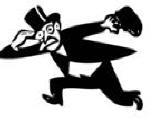A loan is an amount of
money you borrow for some reason. Loans help people buy cars and homes, pay off debts, or pay for their
education. Loans can help a person temporarily.
However, if people owe too much money, they may never be able to get
out of debt. In this case, loans can be harmful.
help people buy cars and homes, pay off debts, or pay for their
education. Loans can help a person temporarily.
However, if people owe too much money, they may never be able to get
out of debt. In this case, loans can be harmful.
Debt is the amount of money
someone owes.
If you borrow $50.00, you have a fifty-dollar debt. Credit card debt
is one kind of debt. Financial
counselors
tell their clients to get rid of credit card debt.
Credit cards charge minimum payments on the card, but minimum
payments do not decrease your debt. In fact, if you only make
minimum payments, your debt is never paid off.
Interest is what the
moneylender makes when he lends someone money. If a moneylender lends someone $100 at 6% interest for
one year, the borrower will have to pay him $106 back. The
moneylender makes a $6 profit. If a moneylender lends someone
$1000 at 25% interest for one year, the borrower will have to pay
him $1250 back. The moneylender makes a $250 profit. It
is always important to check what the total cost of a loan will be.
Then decide if the reason for the loan is good enough to
justify its cost.
money. If a moneylender lends someone $100 at 6% interest for
one year, the borrower will have to pay him $106 back. The
moneylender makes a $6 profit. If a moneylender lends someone
$1000 at 25% interest for one year, the borrower will have to pay
him $1250 back. The moneylender makes a $250 profit. It
is always important to check what the total cost of a loan will be.
Then decide if the reason for the loan is good enough to
justify its cost.
In finances, credit has two
meanings. First, credit refers to the time given to pay money
back.  For example, when people charge something on a credit card, they are
allowed to pay the money back over a period of time. Second,
credit is a payment history or the record someone has of repaying
debt. Does he pay promptly, does he pay late, or does he not
pay? A good record means good credit. A poor payment record
means bad credit. Depending on a person's credit history, he
may or may not get another loan. And with bad credit, he may have to
pay very high interest.
For example, when people charge something on a credit card, they are
allowed to pay the money back over a period of time. Second,
credit is a payment history or the record someone has of repaying
debt. Does he pay promptly, does he pay late, or does he not
pay? A good record means good credit. A poor payment record
means bad credit. Depending on a person's credit history, he
may or may not get another loan. And with bad credit, he may have to
pay very high interest.
Loans, interest, and credit are parts of modern life.
They can be good or bad. It all depends on how people
manage their money. Who is in control? The person
or the lender?
 |